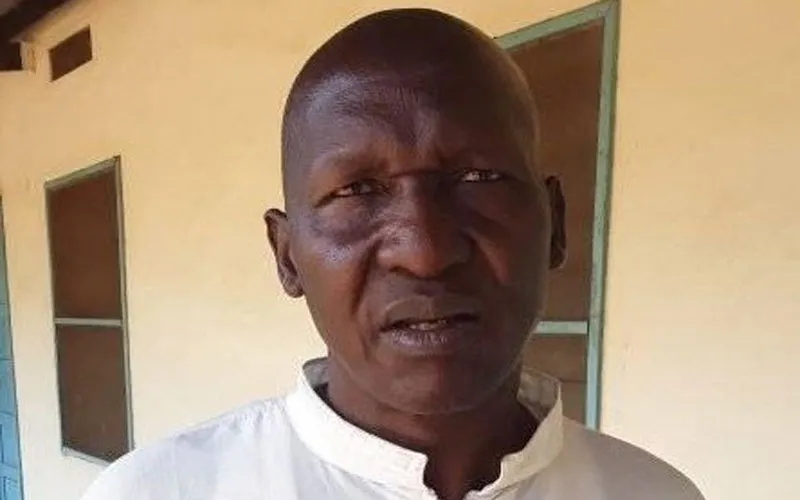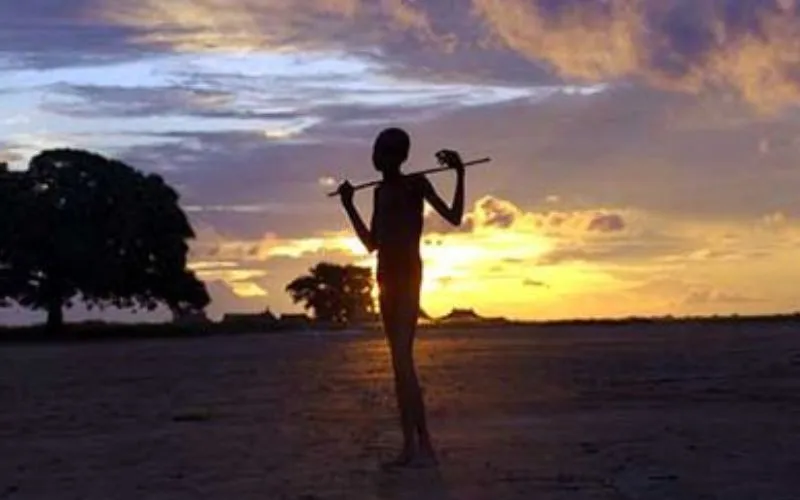When he was preparing to return to the Cathedral for prayers scheduled to take place at 3 p.m., he recalls, at around 2:30 p.m., “I just saw from our gate, I would estimate about 60 young people, opening the gate with force and coming in in a hurried manner, rushing to the building and I saw from the window. I knew there was some trouble coming.”
“They came and stood at all doors so that no chance of escape,” Fr. Kiri recalled, bargaining with himself whether or not to lock the door of his room.
“Why should I close myself in? What wrong did I do to be afraid of anyone? Did I really do anything wrong?” he recalls and decided to open the door of his room.
“When they saw me, they rushed in saying, ‘he is here’, screaming,” he narrated.
“They told me, ‘surrender the key of the house, the house is not yours. It is ours; we are the Christians; we are the Church.’ I found it (key) very quickly and I threw it to them. Then they said, ‘the key of the car, bring the key of the car. The car belongs to us.’ I gave to them,” Fr. Kiri who belongs to Yangwara tribe that speaks Bari language recalled during the interview with ACI Africa correspondent.
(Story continues below)
One youth hit him with “a very serious blow” on the neck and “I went down with my head on the ground … but still I had the strength to get up” and then led him outside the gate of the Fathers’ residence toward the Cathedral building.
“I was taken like under arrest and I submitted to them so they would do anything with me,” he said and added in reference to the youth, “They drove the car to the Cathedral and the car up to now is still there.”
“They took me to Church because that is where they were meeting,” Fr. Kiri explained and recalled the sympathy he received from a section of the youth who attacked him.
“I got out of their hands because there are some good people among them who knew me and they saw me and became sad. And somehow some of them, even with certain signs, seem to have indicated to me not to worry. They were saying in their signs, wait, we will do something,” Fr. Kiri disclosed and added, “Probably a small group detached itself from the (main) group.”
It was a member of this small dissenting group of the protesting youth that facilitated getting the house and car keys back to Fr. Kiri, he said during the interview.
“They are our youth,” he said, adding that the protesting youth “made me to sit under arrest without being told why I was there” and that there were, among the youth, those who treated him with insults and others who “were assuring me to be calm.”
“There are our boys. I feel that something has gone wrong, otherwise they would have not done what they did,” Fr. Kiri reflected and added in reference to the mob of the youth who attacked him with blows, falling twice on his face, “May be they must have been misinformed by someone, manipulated by someone, I don’t know, for his or her purposes.”
While the announcement he made at the Cathedral that Sunday morning about the decision by the Holy See to have the Archbishop-elect Ameyu installed on March 22 might have triggered the assault on him, Fr. Kiri sees the attack as part of a wider plot to intimidate him as the Coordinator of the activities leading to the installation of the new Archbishop.
“They should have seen my name and obviously if they saw my name, whoever is reacting would have seen me a dangerous guy who has been introduced into the system and so I have to be managed,” Fr. Kiri told ACI Africa referencing the role he was given to oversee the committee organizing the installation ceremony.
“I am not angry against the youth; they are my children,” he said and added, “If they wanted to kill me, they would have killed me, given their number and the anger. They were not in for killing; I guess it seems they wanted to send a strong message.”
The anger of the crowd of the youth, Fr. Kiri said, seems “directed against the Pope.”
“But when I heard they wanted the Pope to come here to them, then I was like, do they even know who the Pope is in the world; do they know the figure of the Pope in the world? So, I understood there is something lacking somewhere,” Fr. Kiri probed and reflected.
He wondered what had come of the same young people he had seen sing together during the centenary celebrations of Catholicism in the Archdiocese of Juba.
“I am just surprised that all of a sudden from our good singing together, when we remember the centenary days when we sang and praised the Lord together; no matter the tribe we came from, we were there as brothers and sisters,” he said and cautioned, “We should not give ourselves too quickly to resentment, to fears and anger.”
He expressed his love for the youth who had attacked him describing them as “people we sing in Church together.”
He regretted the subsequent attack on the youth who seemed to side with him saying, “I was sorry to learn that in fact behind me, as I left, several youth got beaten, physical injuries on their heads.”
“That is not what we should be doing,” he said and added, “We should be together again, there is nothing better than brotherhood, sharing and being together.”
He said preparations for the installation of the Archbishop-elect are ongoing and that “with God’s help, we hope to achieve what has been given to us by way of assignment.”
“We know the situation is completely not favorable, but even all the more now we think this is the time really to dedicate ourselves, our energies to do something good for our Church,” Fr. Kiri said and added, “We pray and rely on the power of God. If it is His work, on the 22nd we will have the installation.”
He described the protests around the Archbishop-elect and the attack on him as an opportunity “for our edification” rather than “discouragement.”
“We are trying to build our Christian sense; the sense of being a Christian is not easy,” Fr. Kiri said.
He called on Catholics across the globe to pray for the Catholic community in South Sudan.
“As a Catholic community all over the world, we should not be discouraged, rather share with us your prayer so that through your prayer we grow in Christ every day,” Fr. Kiri said.
To the Catholic community in Juba Archdiocese, he said, “Let us come back to ourselves; we have strayed a little bit. We should just retrace our way back to the right path and God will always reconcile us with himself and with one another.”
Peter Mapuor Makur, ACI Africa correspondent in South Sudan, contributed to this news report.
Fr. Don Bosco Onyalla is ACI Africa’s founding Editor-in-Chief. He was formed in the Congregation of the Holy Ghost Fathers (Spiritans), and later incardinated in Rumbek Diocese, South Sudan. He has a PhD in Media Studies from Daystar University in Kenya, and a Master’s degree in Organizational Communication from Marist College, New York, USA.








